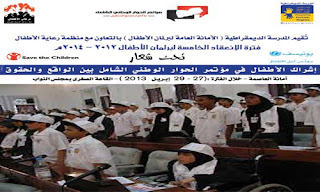NDC members demonstrate for release of Yemeni detainees abroad
By Akram al-gaolahiNDC members staged a protest in the lobby of
Sana'a's Movenpick Hotel on Monday to demand the release of Yemenis who
are presently detained abroad.
In particular, the protesters are concerned over Yemeni detainees at the US facility at Guantanamo Bay, Cuba and Yemeni fishermen who are in detention in regional prisons. Some protesters did, however, also mention Yemenis who had disappeared as a result of extrajudicial arrests.
Among the slogans on the placards held up by the protesters were 'Oh, US - where are human rights at Guantanamo?' And 'Release Yemeni fishermen from foreign prisons'.
Arwa Abdu Othman, the chairwoman of the Working Group on Human Rights and Freedoms, said her group was working hard to address all rights issues - and individuals' rights in particular.
"In the end, we want our discussions to take the country into a new era. We are focusing on individual rights inside our society - or, rather, how to make the government or groups better provide for individuals' rights," said Othman.
Speaking about the importance of her group's tasks, she added, "Building an individual means building a country. If the individual's rights are lost in favor of political rights, a tragedy ensues".
Othman affirmed that the agenda for the Rights and Freedoms Working Group's was moving forward in a positive direction. She pointed out that the group's committees had finalized their preparatory tasks, such as developing guidelines for the constitution.
"So far, there is unanimity on key issues, including how to ensure equality of opportunity, freedom of speech, religious freedom, intellectual and cultural rights, and adherence to international conventions on human rights."
In particular, the protesters are concerned over Yemeni detainees at the US facility at Guantanamo Bay, Cuba and Yemeni fishermen who are in detention in regional prisons. Some protesters did, however, also mention Yemenis who had disappeared as a result of extrajudicial arrests.
Among the slogans on the placards held up by the protesters were 'Oh, US - where are human rights at Guantanamo?' And 'Release Yemeni fishermen from foreign prisons'.
Arwa Abdu Othman, the chairwoman of the Working Group on Human Rights and Freedoms, said her group was working hard to address all rights issues - and individuals' rights in particular.
"In the end, we want our discussions to take the country into a new era. We are focusing on individual rights inside our society - or, rather, how to make the government or groups better provide for individuals' rights," said Othman.
Speaking about the importance of her group's tasks, she added, "Building an individual means building a country. If the individual's rights are lost in favor of political rights, a tragedy ensues".
Othman affirmed that the agenda for the Rights and Freedoms Working Group's was moving forward in a positive direction. She pointed out that the group's committees had finalized their preparatory tasks, such as developing guidelines for the constitution.
"So far, there is unanimity on key issues, including how to ensure equality of opportunity, freedom of speech, religious freedom, intellectual and cultural rights, and adherence to international conventions on human rights."
*NDC.COM























